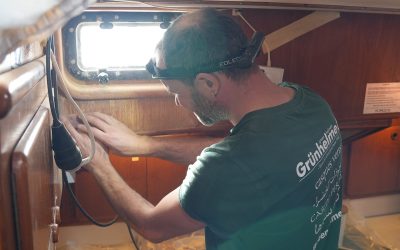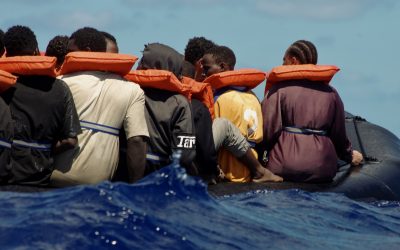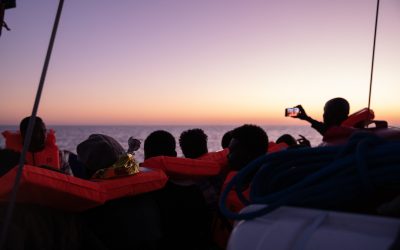Nadir’s tenth and final deployment in the Mediterranean in 2024 was characterized by uncertainties and adversities in the first three weeks of November. It was questionable how the new agreement between Italy and Albania would change the situation, we observed the so-called Libyan Coast Guard intercepting boats, had challenging night-time search operations and had to decide which area we should patrol, as there were hardly any other civilian lifeboats in operation.
Concern about the new agreement between Albania and Italy
A year ago, Italian Prime Minister Giorgia Meloni and her Albanian counterpart Edi Rama signed a five-year agreement allowing Italy to set up two camps in the Balkan country. Refugees rescued by the Italian coastguard are to be taken in there and their asylum applications processed directly so that they can then be allowed to enter Italy – or deported to their countries of origin.
During the mission in November 2024, we were one of the first players on the ground with the Nadir. At that time, the Italian naval vessel Libra was deployed for the second time to bring refugees to the Albanian centers. While Meloni had said she was “proud that Italy has become a role model”, the Nadir was only a few kilometers away from the Libra and ready to help boats in distress.
We feared that the Italian authorities might order us to take the refugees to the navy ship. Fortunately, this did not happen and we were relieved when the news came on November 6 that the Libra was leaving the area. We were less happy that the 80-metre-long warship with its 70-strong crew had eight men from so-called “safe countries of origin” on board on its way to the Albanian coast.
A busy first week: 102 people supported
In the days leading up to the deployment of the naval vessel Libra, the Nadir responded to several maritime emergencies that came in via Alarm Phone. On Wednesday, November 6, we encountered an overcrowded rubber dinghy with 30 people on board. The crew provided them with life jackets and escorted them to Italian waters. On Friday, the Nadir came across a wooden boat with 37 people. All the people on board were single men, mainly from Bangladesh and Egypt, countries that are considered safe – a necessary criterion for bringing them to the new camps in Albania. We were therefore relieved that the Libra was no longer in the area of operation. After stabilizing the boat, night fell, wind and waves increased and thunderstorms could be seen on the horizon – we were grateful that the Italian coast guard arrived quickly, took everyone on board and brought them safely to Lampedusa.
During the night from Saturday to Sunday, the Nadir received another distress call from Alarm Phone. After sailing through the night, on Sunday morning we found an overcrowded wooden boat with 35 people on board, including five women, seven children – one of whom was disabled – and two babies. The Nadir accompanied the boat for more than five hours and then received instructions from the MRCC Rome to take the people on board, even though an Italian coastguard vessel had already arrived.
During the evacuation to the Nadir a ten-year-old girl showed us the contents of her rucksack: a small white cat called Yuki. Apart from the backpack with a window for the cat, the girl had brought everything she needed to look after her – including a box of cat litter. We were touched by the love and care with which the girl looked after Yuki.

Calm seas – and illegal activities of the so-called Libyan coast guard
After the intense days and adverse weather conditions of the first week, the wind and waves calmed down, meaning that both Tunisia and Libya had ideal conditions for boats to set sail. This also caused the so-called Libyan coastguard to become more active, which our crew unfortunately witnessed at close quarters.
On November 12, we were informed of a distress at sea about 20 nautical miles north of the Libyan SRR and thus within the Maltese search and rescue zone. When we had visual contact with the boat in distress, we also saw a ship of the so-called Libyan Coast Guard on the scene. The Nadir announced that it was ready to help and take the people on board. But we were ignored.
Before we were close enough, the Libyan ship had disappeared, leaving behind only the empty boat – with traces of the people who had recently been sitting on the benches: a shoe, a sweater, a headscarf. We decided to search the area to make sure that no one had jumped into the water to avoid the dire consequences of a pullback to Libya: Detention in violation of basic human rights, humiliation, violence or even illegal deportation to the Libyan desert.
Although these practices are widely documented and condemned by human rights activists and international organizations, they continue to take place. As of October 2024, it is estimated that more than 17,500 people have been intercepted and returned to Libya, although this number is likely to be significantly higher due to invisible, undocumented returns. This also shows how important it is to be on the ground, monitoring and documenting illegal activities in the Central Mediterranean.
Searching at night in the moonlight, empty boats and worries
Only 24 hours after the illegal interception by Libyan actors, the Nadir received information about the distress call of a boat in the Maltese SRR. We reached the last known position of the wooden boat with about 60 people on board early in the morning and conducted a long and arduous search operation – aided by the bright moonlight. We found two empty boats, one of which matched the Alarm Phone description. We hoped that the people had been taken on board by an Italian coastguard vessel – which Alarm Phone later confirmed.
Daylight brought two more empty drifting boats and another distress call in the Maltese SRR. The Nadir headed for the last known position. As the boat became visible on the horizon, a ship approached at high speed from the south. We were initially unable to identify the vessel and feared that it was once again the so-called Libyan Coast Guard. After several attempts to radio the ship, it turned out to be the Italian coastguard, who would take the people on board and bring them to Lampedusa – everyone on board breathed a sigh of relief.

Lots of movement in the Tunisian SAR and an international maneuver
After seeing so many forces and so much activity from the authorities, it was no surprise when we learned that an international maneuver was taking place off the northern coast of Tunisia. The operation ran from 5 to 15 November 2024 under the title “Phoenix Express 2024” and was organized by the United States Africa Command (AFRICOM). The aim of the maneuver was to strengthen security cooperation in the Mediterranean, combat illegal immigration and improve search and rescue operations. The countries involved in the operation included Tunisia, Italy, Turkey, Malta, Portugal, Algeria, Morocco and Libya. The maneuver may also explain the presence of the Libyan naval vessel “Ibn Auf” in Italian SRR waters, which was reported during a reconnaissance flight conducted by Seabird2.
We expected that the large number of forces in the area would increase the risk of pullbacks and prevent departures from Tunisia for the duration of the maneuver. On November 15, we learned that a shipwreck had occurred on November 8 despite the presence of all these actors. According to a report received via Alarm Phone and published on the IOM Missing Migrants Data Portal, a boat with 52 people on board had capsized off the coast of Sfax – 37 people survived, 15 died or are missing.
On the same day, November 15, 2024, another fatal shipwreck occurred off the coast of Al-Zawiya in Libya. A boat with 64 people from Mali, Sudan and Guinea on board capsized. 50 people – including women and children – are missing, only 14 survived, as reported by IOM Libya. Once again, we witnessed how the current approach of EU countries – by signing agreements, training forces and funding third countries – is systematically costing human lives.
Search among fishing nets – and rescue of 51 people on the last night of the operation
On the last night of the operation, the Nadir received a report via Alarm Phone of a rubber dinghy in distress with around 30 people on board. The people had reported that the boat had become entangled in nets and was unable to maneuver. We started a search operation in the area. The entire crew was on deck and kept a lookout, as there were nets and marker buoys everywhere in the shallow water.
After searching for about an hour and a half, we didn’t find the rubber boat, but at around 3 a.m. in the dark we came across an extremely overcrowded wooden boat with 51 people on board. The boat was unstable and water was leaking in. Around 15 people were lying on the lower deck and were at risk of carbon monoxide poisoning. Due to the dangerous conditions, we decided to get everyone on board the Nadir as quickly as possible. One young man had wounds on his feet and legs because he had been attacked with rubber bullets by the Libyan authorities on the beach before departure.

Many of the people told how this part of their escape had started two days earlier. They had to wade through the water or swim to the boat after hiding on the beach. As if to prove it, considerable amounts of sand collected in all corners of the Nadir’s deck during the crossing. One little boy said that this was the eleventh time he had tried to cross the Mediterranean, while a Syrian couple were grateful and surprised that they had made it the first time. When the Nadir entered Italian territorial waters, a 16-year-old boy helped the crew members. crew members crew members hoisting the Italian host countryanthe – a special moment for everyone on board.
Why it is important to keep going
As the Nadir now has to take a break due to the annual maintenance and shipyard work, we are grateful that other NGOs are either still active or will be in the coming months. Once again, we have seen how important it is to be on the ground to monitor and document what is happening in the central Mediterranean and to support people on the move and in distress at sea. All of this remains important, even though the number of arrivals by sea to Italy fell by 60 percent in 2024 – because the number of deaths at sea has fallen much less sharply. Something must be done to counter the deadly border policy – solidarity must prevail.




